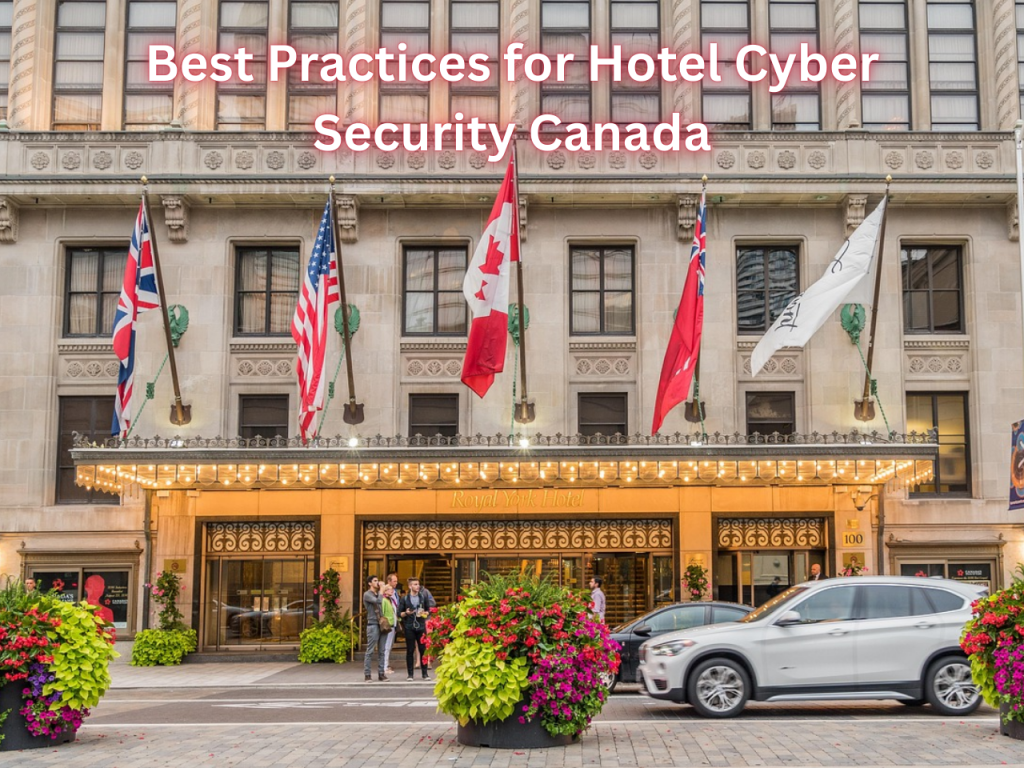Securing Canadian Hotels from Cyber Attacks: Best Practices
The hospitality industry is a business built on trust. This is because as visitors come, they will want comfort, safety, and privacy. However, with the advent of modernization and advancement in technology, cyber threats have become an increasingly significant concern. This could not be truer for hotels and accommodations in Canada that faces issues such as hotel ransomware and worries about payment system security. That is why by adopting best practices for hotel cyber security, Canada-based hotels are upholding their promise to their guests of providing comfort and security while staying under their roof. Furthermore, guest data concerns are also addressed and kept away from these online criminals.

Best Practices for Hotel Cyber Security Canada
Why Cyber Security Matters for Hotels
Hotels deal with a lot of personal and financial data. This starts from online bookings, through ongoing purchases in their facilities like restaurants, up until payment and check out. This guest data from all these transactions are vulnerable without powerful hotel cybersecurity, Canada. Knowing this, you would understand why cyber criminals target hotels. It is a store house for guest data as well as financial information from payments systems. Security is therefore important especially as bank cards run through interconnected systems like Wi-Fi networks and room access controls.
Needless to say, a single breach in the system can have catastrophic results. This can lead to financial losses from hotel ransomware or fraud, guests losing trust in the hotel, as well as marred reputation. Moreover, operational downtime is another issue that further increases financial waste and decreases customer satisfaction. Finally, the hotel can also face legal backlash from the data protection breach. According to the Canadian Anti-Fraud Centre, cases of cybercrime are on the rise across all industries, and the hospitality industry is no exception. Hence the call for strong hotel cyber security, Canada.
Common Cyber Threats Facing Canadian Hotels
The first step to prevention is knowing what the threats are. The most common attacks include:
Hotel ransomware
This is when criminals encrypt hotel systems, demanding payment to restore access.
Phishing scams
These are fake emails that aim to trick staff into sharing login details or downloading malware. Once the crooks get these details, they can get into the system to create more damage.
Payment system security breaches
Financial details are one of the most enticing for hackers. They usually target point-of-sale (POS) devices to steal card and guest data as well as other financial information.
Guest Wi-Fi exploitation
Unsecured networks in public places such as hotel lobbies and restaurants are also avenues for threat actors to guest communications and information. This can also include “port jacking” where criminals use charging points to get their malware into devices.
Insider threats
Disgruntled or careless employees exposing systems to risk. This may also include devices that may have been misplaced that are portals to hotel, financial, and guests data.
Best Practices to Secure Your Hotel
These threats should be countered by a proactive initiative as part of strengthening hotel cyber security, Canada locations. Below are some strategies that are best practiced and incorporated into the company cyber hygiene.

Best Practices for Hotel Cyber Security Canada2
Strong Payment System Security
Your payment system security is critical. Make sure your POS machines and online reservation systems are PCI DSS compliant. Use end-to-end encryption to protect all card transactions.
Train Your Staff
Employees serve as the first shield against threats, but only if they are knowledgeable. Otherwise, they can be the “human factor” that can cause the cyber security system to fail. It is therefore imperative to put them through frequent cybersecurity training. This is to make them aware of phishing emails, hotel ransomware, odd links, as well as odd activity within the systems. This training must not just be interactive and memorable to encourage retention; it can also include simulations that allow them to visualize and manipulate what can happen if a breach occurs.
Implement Multi-Factor Authentication (MFA)
All staff log in must be equipped with MFA as part of getting through the system. This is an extra layer of security in addition to passwords.
Secure Guest Data
Encrypt stored guest data and limit access to authorized staff only. Make safe data storage and deletion practices.
Update Systems Regularly
Hackers love old software and their vulnerabilities. Therefore, it is important to ensure that updates and patches are applied in time to seal possible ports of entry for possible hotel ransomware attacks.
Monitor Network Activity
Monitor the network traffic that triggers suspicious behavior by using network security systems. Track the internal and guest Wi-Fi usages as well.
Prepare for Incidents
Develop a plan to respond to the incident in case of a cyber-attack. This is so your team has an idea of the action to take. Check with your managed IT support provider for any business continuity and disaster recovery system your hotel can adapt.
Staying Ahead of Hotel Ransomware Attacks
Hotel ransomware is one of the fastest-growing threats in the industry. To prevent these attacks make sure to have daily offline back-ups of main systems. A good email filtering to deny malicious attachments is also recommended. Lastly, constrained access levels to sensitive parts of the network. Prevention saves the cost of downtime and loss of reputation, which is incurred by hotels that invest in prevention.
Compliance with Canadian Privacy Laws and Upholding Guest Trust
The Canadian hotels have to be in accordance with PIPEDA (Personal Information Protection and Electronic Documents Act). This means having clear policies for collecting, storing, and sharing guest data. Non-compliance can lead to costly fines and legal consequences. Hotel cyber security, Canada locations, is both a technical responsibility and a legal obligation.
Additionally, guests have now become more privacy-conscious. To sell the idea of safety, hotels can market their promise to be secure. That refers to emphasizing secure booking systems, safe payment processes, as well as secure Wi-Fi connections in the marketing materials. Afterall, a loyal guest is a safe guest.
Securing the Future of Your Hotel with EB Solution in Hotel Cyber Security, Canada
EB Solution has many years of experience in protecting against cyber threats to Canadian businesses. Their hybrid approach to hotel cyber security in Canada embraces technology, and it entails real-life, convenient processes. From securing payment system security to protecting sensitive guest data, Our team helps hotels reduce risks, improve compliance, and maintain customer trust. Clients from various industries, including hospitality, have always relied on trust, and we make sure to deliver.
Invest in proper cybersecurity of the hotel in Canada now!
